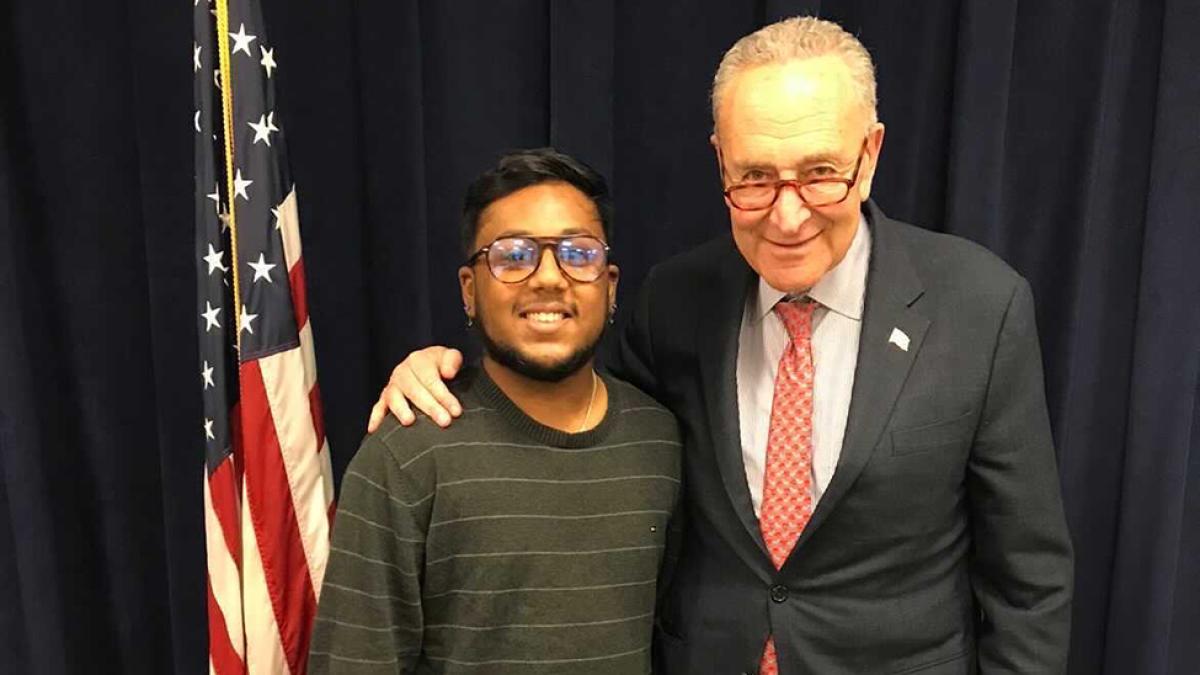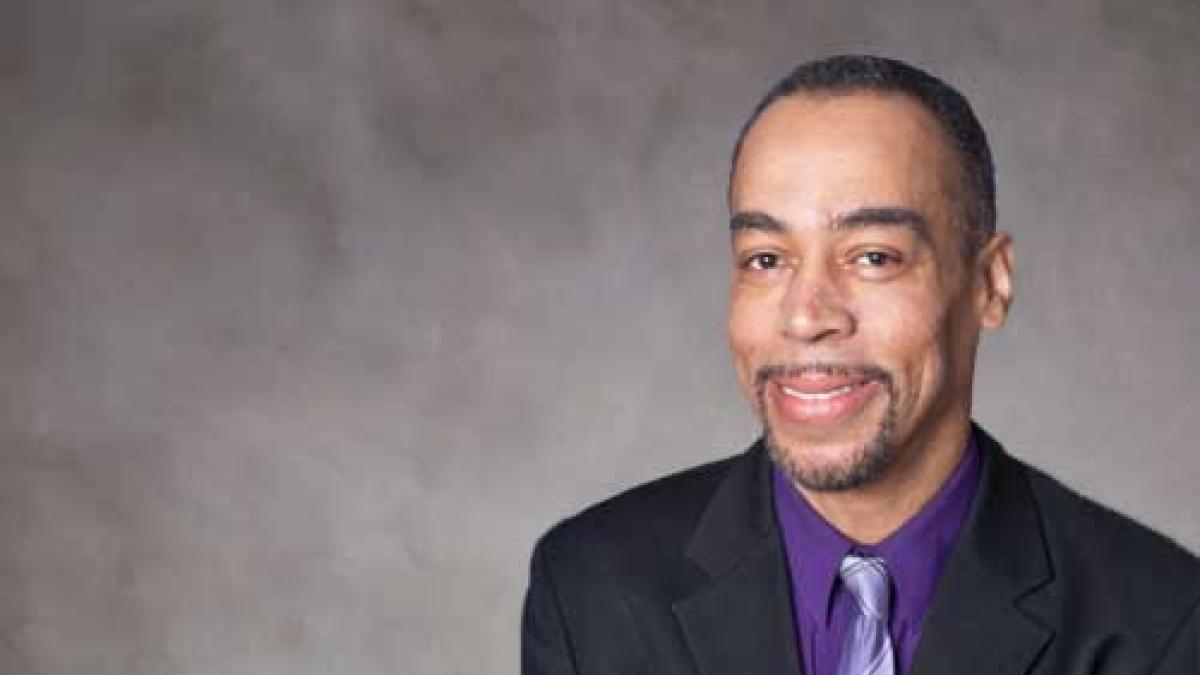Provisions, a Bhandari Jain Family Food Pantry, is one of Pace’s hidden gems. Get the inside scoop on Denise Santiago’s journey opening a food pantry, and how Provisions is helping fight food insecurity on the New York City Campus.
The Thoughtful Filmmaker
Through the Provost’s Summer Student-Faculty research program, Julian Clark ’25 delved deep into the multifaceted interplay between film-making and religious studies.
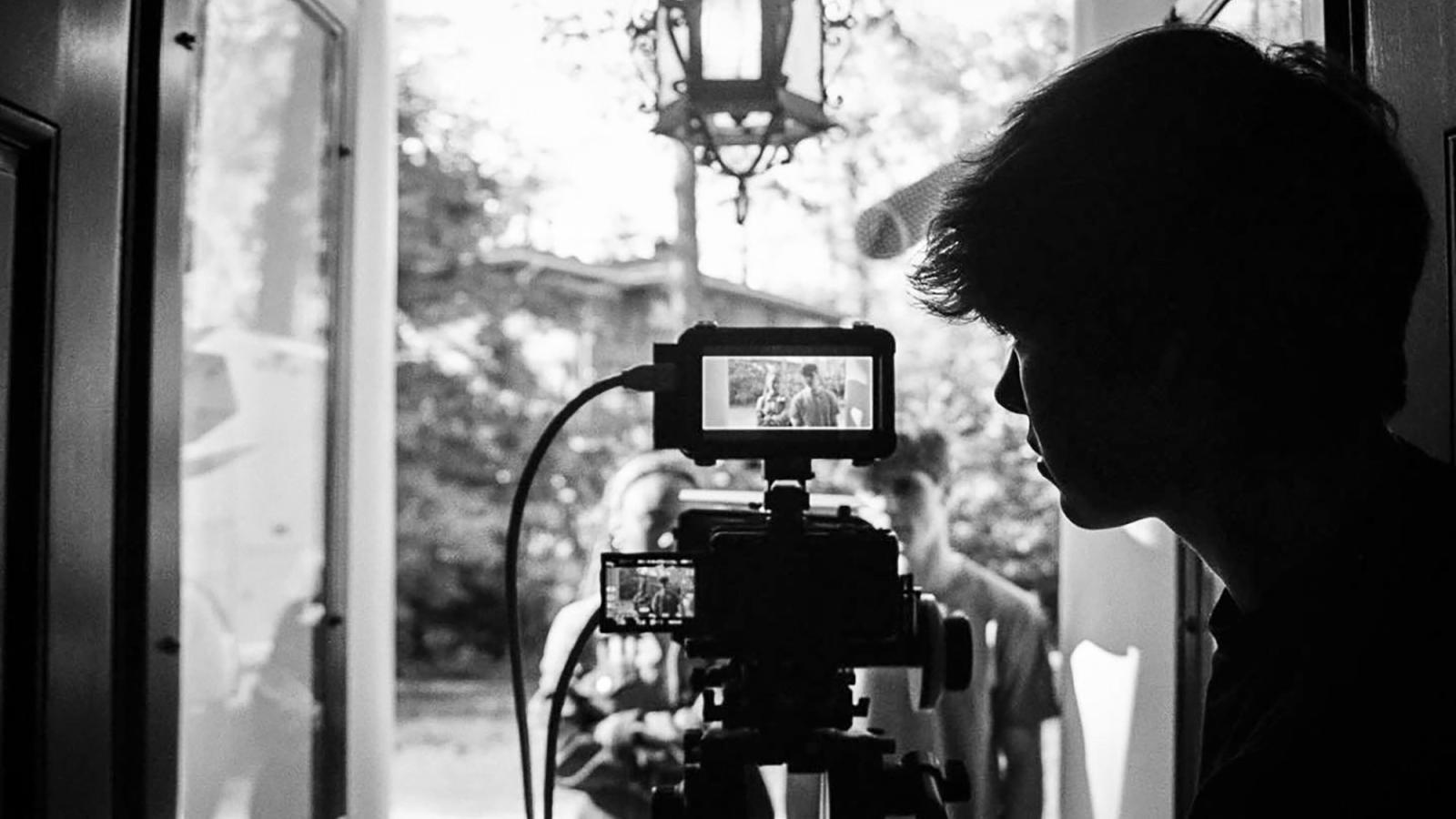
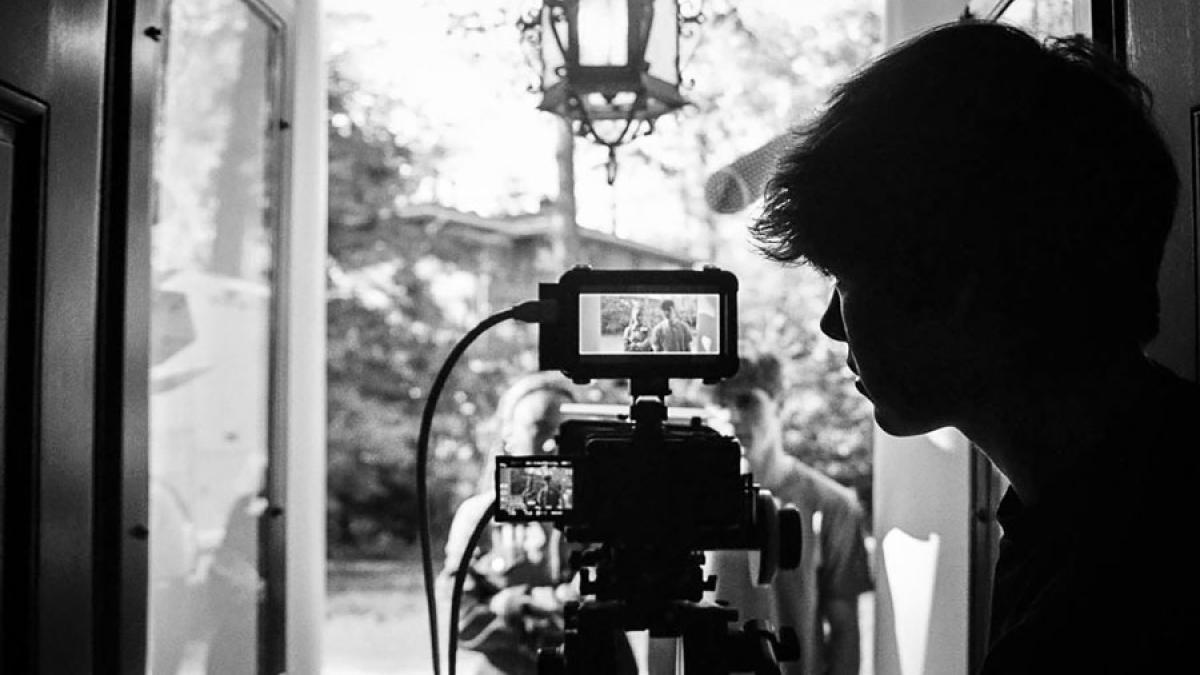
Julian Clark ’25 has long been fascinated by religion, and the role it plays in both the lives of individuals and groups. Growing up in the Methodist and Baptist churches, Julian began to think deeply about the endless well of ever-complex issues relating to religion. Eventually, he merged this curiosity with another strong interest of his—film—and as a high schooler, directed a film titled The In-Between Hour, which Julian describes as “an alternate look at the concept of purgatory and the self-expressive presumption of ego.” The film premiered in July 2021, raising $500 for Mental Health America.
When Julian arrived at Pace a few months later, he was planning on taking his interest in film even further, majoring in film and screen studies while planning on using New York City as the ultimate backdrop for movie-making. Yet, the pull of religious study remained strong. In his first semester, Julian took a class titled Introduction to the Study of Religion, taught by Philosophy and Religious Studies Assistant Professor Daniel Barber, PhD. In the class, Julian was able to further explore ideas pertaining to how religious studies is approached. He also became interested in the concept of religious formation around material goods, and the ways in which religions evolve over time to meet the needs of the current moment.
“Religions are and will continue to be made and corrected based off the needs of the current era,” says Julian. “Christianity has evolved dramatically from what it was in the past—it reflects the lives of people now. I wanted to conduct research around the origins of faith, how these practices are meeting the needs of the present, in order to understand how in the past, they were made fit to meet the needs of the past.”
I wanted to conduct research around the origins of faith, how these practices are meeting the needs of the present, in order to understand how in the past, they were made fit to meet the needs of the past.”
Julian’s appetite for further exploration around these topics naturally coincided with his interest in film. After discussing his ideas with Barber—who helped him solidify his focus and offered further research recommendations—Julian developed a research proposal, and was successfully accepted into the Provost’s Summer 2022 Student-Faculty Research program.
His project, Religion and Non-fictitious Film-making: The Fallacy of "Accurate Portrayal", explores the relationship between faith and filming. As Julian uncovered—through both filming sessions around New York City, as well as intense study of religious and film scholars ranging from Trinh Minh-Ha to Jean-Luc Godard to Talal Asad—this relationship is inevitably fraught, as faith is a task unobtainable for film-makers to wholly capture. Julian likened it to an unspoken violation of a moral code.
“What I started to realize was that there was no real way that I could document a participant's experience without infringing on a moral code. This idiosyncratic connection is something that you’ll never truly be able to capture the truth of someone’s relationship as a foreigner to these credences—especially with something like religion, which is so incredibly personal, and so complexly tied to such a shared social context, that it ends up preventing diligent film-making from those who seek it.”
Julian’s experiences culminated in an academic research paper in which he explores this relationship in great detail—as well as the ways in which religious connectivity can and cannot be captured through film. In addition to possibly submitting the paper for academic publication, the experience has reframed how he approaches filmmaking, as well as his Pace experience going forward—fittingly, Julian is now a double major in both Film and Screen Studies and Philosophy and Religious studies.
As he continues both his collegiate and filmmaking career, he hopes to take what he’s learned from his experiences and research to push and explore boundaries in the unique space where filmmaking and religious studies co-exist.
“The research really inspired me to go deeper, and not just look at the formation of religion, but to think about faith as a unique social experience,” said Julian. It changed how I am going to film moving forward.”
More from Pace
In his second semester, he interned for a Manhattan Borough President campaign. Last semester, he interned for Senate Majority Leader Charles Schumer’s district office. As a second-year student, Aman Islam is demonstrating what it means to be a go-getter, and he shows no signs of stopping.
Through Digital Trash, an augmented reality art exhibit, Professor Will Pappenheimer and his mobile media students are elucidating an often-unseen problem in a truly innovative way.
The Importance of Giving Back: Jan Mansley '90
Jan Mansley '90, Dyson Advisory Board member and vice president of NOVA Hope for Haiti, discusses her life-changing decision to devote her life to others, as well as how and why students should get involved in a greater cause.
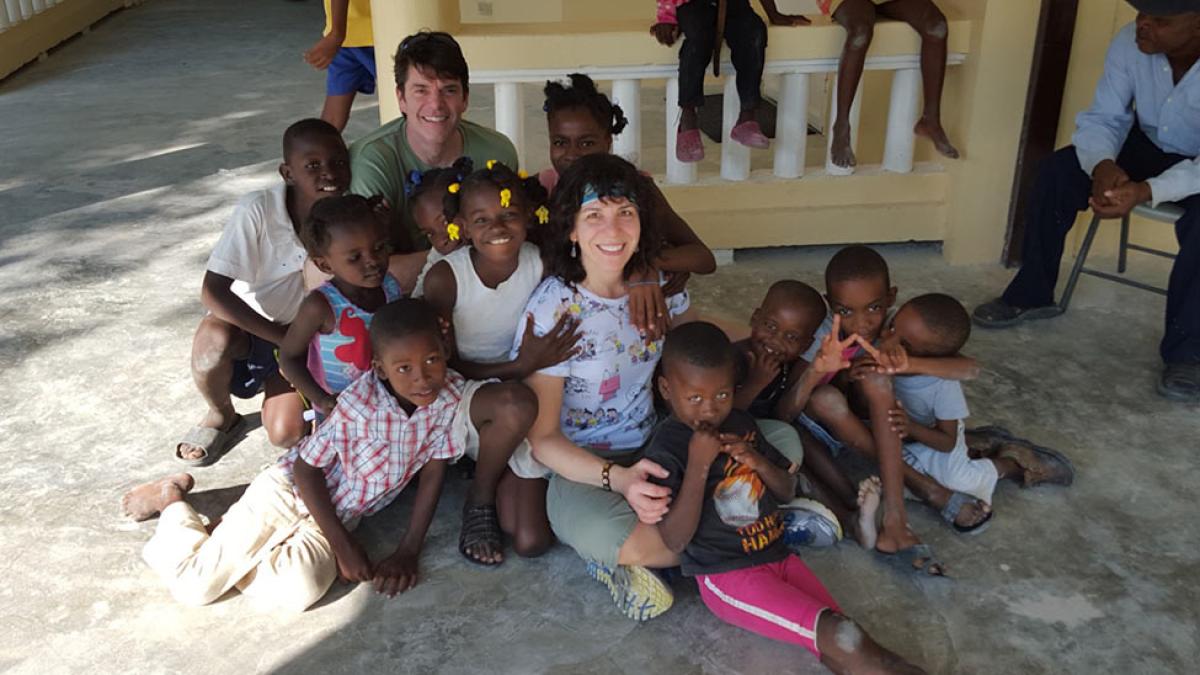
Dyson Advisory Board member Jan Mansley ’90, MBA (Lubin), has found her passion in giving back. After a successful career in banking and raising two children, Mansley now serves as the vice president of NOVA Hope for Haiti, an organization that provides medical care through permanent clinics and frequent missions to Southwest Haiti.
Mansley met her husband, Tom ’89, Math, MBA (Lubin), at Pace University, and both emphasize the importance of improving the lives of others. In addition to both serving on the Dyson Advisory Board and working with NOVA Hope for Haiti—Tom is the treasurer—the couple established The Tom and Jan Mansley Endowed Scholarship, which is awarded annually to a Dyson math student. Community service experience is a requisite for the scholarship.
In her interview with Director of the Center for Community Action and Research Heather Novak, MPA, Jan encourages current Pace students to get involved with volunteering to help others while developing valuable personal and professional skills.
Math students can apply for The Tom and Jan Mansley Endowed Scholarship by November 28, 2022. Students interested in volunteering can visit the Center for Community Action and Research.
Turning Real-life Research into Impactful Advocacy
Through the Master of Public Administration program and a partnership with the Westchester Children's Association, Sydney Moraitis '22 helped spearhead a survey that's drawing attention to digital access inequities among Westchester County families with children in grades K-12.
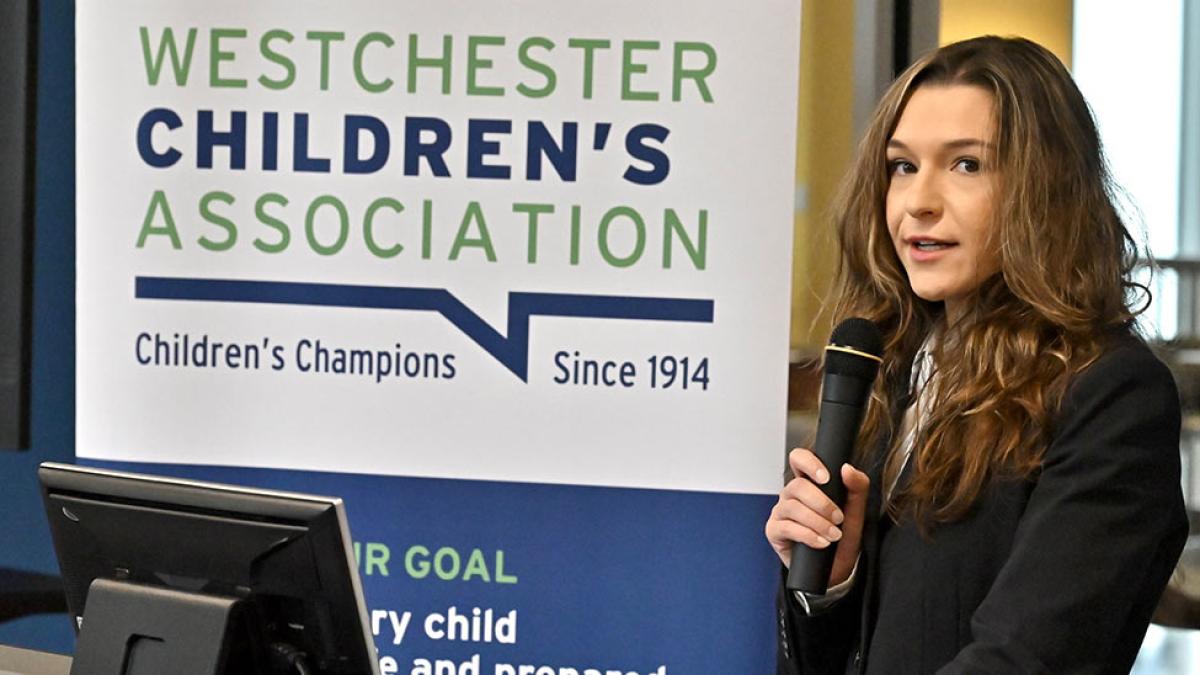
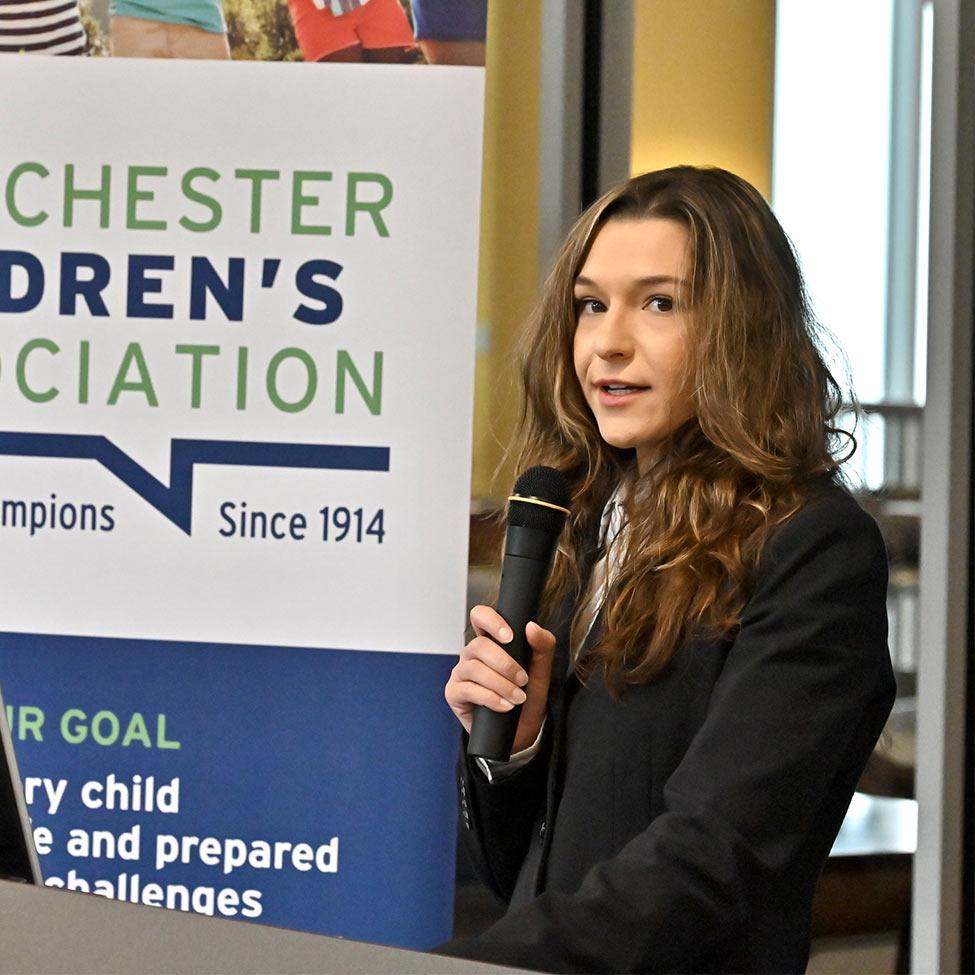
At the heart of Pace University’s Master of Public Administration (MPA) program is the conviction that thoughtful research has the power to spur meaningful change. Sydney Moraitis ’22, MPA, has experienced that firsthand.
In partnership with the Westchester Children’s Association (WCA), Moraitis and Associate Professor and Director of MPA Gina Scutelnicu-Todoran, PhD, spearheaded the “Digital Access Survey: Perceptions of Parents in the K-12 Schools of Westchester County, New York,” which surveyed families on their digital access, skills, and knowledge. Moraitis and WCA then presented the findings of the survey at a press conference on Pace’s Westchester campus in October.
“The Covid-19 pandemic affected both students and families as their daily use of technology increased, which exacerbated the pre-pandemic digital divide,” said Moraitis. “To provide support for those who lack technology access in terms of devices and skills by means of training, identifying what the needs are in a community is an important first step.”
Embracing the Process
This survey was a follow-up to a study conducted during the height of the pandemic that MPA graduate Greg Rivera ’21 had assisted WCA in conducting as part of his capstone project, focusing on the impact of remote learning on K-12 families in Westchester. Rivera and his mentor, Scutelnicu-Todoran, presented the recommendation for a follow-up survey a year later.
Moraitis’s involvement was a bit serendipitous. She inquired about working on a project with Scutelnicu-Todoran and mentioned an interest in educational policy. Scutelnicu-Todoran connected Moraitis with WCA, and this time, the Pace MPA team owned the entire survey process, from origination to dissemination to evaluation. While the original survey focused specifically on remote learning, this year’s iteration focuses more broadly on families’ access to and comfortability with reliable internet and technological devices.
Moraitis noted that the biggest challenge in conducting this year’s study was getting the survey to as many families as possible. “We believed that it was important to make efforts to include the voices of those who didn’t have access to an electronic device,” she said.
Moraitis and the team then met with a number of WCA’s partner organizations in the area, persuading them to distribute hard copies of the survey to families in both English and Spanish and set up physical drop boxes for collection.
Presenting the Results
Upon analyzing the results, the survey demonstrated an inequity in technological access between children and families from under-represented groups and their peers in Westchester County. Among the 511 parents and guardians surveyed, 27 percent said they experienced stress related to technology at least once a week, while 31 percent felt technology made their children’s learning more difficult. The survey also revealed evidence that participants who were of Hispanic/Latinx descent and whose primary language was not English were less likely to have internet access.
“We hope the survey findings will assist local leaders and stakeholders in determining the best ways to provide services to improve digital access and digital literacy so that both children and their families are well equipped to participate online,” said Moraitis.
Scutelnicu-Todoran connected the results directly to recommended policy and action aimed at narrowing the digital divide: “School districts and the NYSED should provide digital resources that are geared towards different constituent groups – whether it’s providing access to devices and internet, offering digital training, raising awareness about internet affordability programs, or ensuring multiple communication channels between educators, parents and students.”
WCA proposed the idea of presenting these results and recommendations at a press conference. With the help of the Pace University Public Affairs team, the event on October 4 drew a diverse crowd, including Westchester County legislators, representatives from nonprofit organizations, news outlets, and members of the Pace community.
Putting Skills into Practice
The Pace Path aims to connect students to immersive, applicable experiences to enhance their learning. Moraitis is grateful for the opportunity through the MPA program and with WCA to have been wholly involved in the survey process from its design to the presentation of the results.
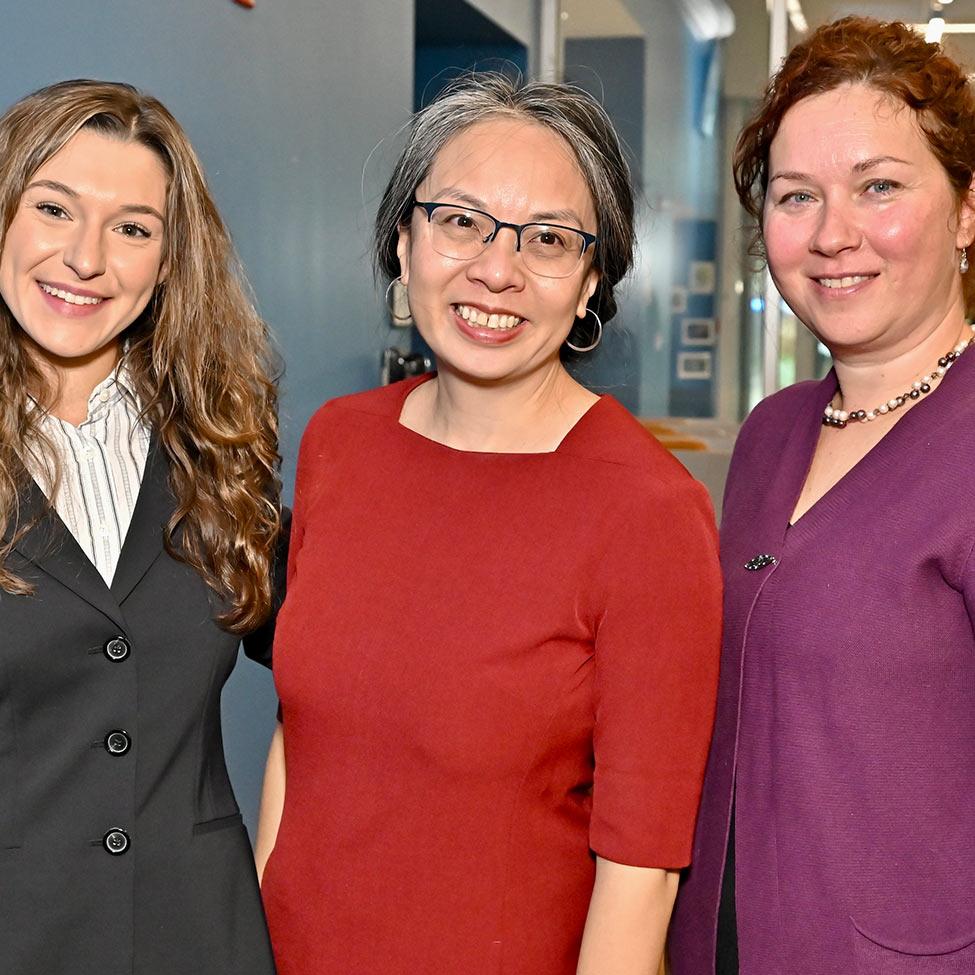
“This was a rewarding opportunity working with an advocacy organization as I learned the importance of forming relationships and partnering with other relevant organizations,” said Moraitis. “I want to especially thank Limarie Cabrera at WCA who took me under her wing during my internship, providing me with opportunities to learn about creative and innovative ways to express data.”
Scutelnicu-Todoran notes that these kinds of opportunities help set the Pace MPA program apart.
“Real-life learning experiences such as this provide our students with the opportunity to acquire practical skills, participate in policy making, network with potential employers and make a difference in their communities,” she said. “Once our students graduate, they have the necessary skills to be successful and secure a job in their area of expertise whether it’s in the nonprofit, public or healthcare industry.”
Real-life learning experiences such as this provide our students with the opportunity to acquire practical skills, participate in policy making, network with potential employers and make a difference in their communities.
And in learning these skills, students are empowered to enact real change. As a result of the survey, WCA is advocating for Westchester County to earmark $125,000 in the 2023 budget to establish a digital equity and inclusion director position. Additionally, WCA has created a digital access workgroup, consisting of school district officials, representatives from country departments and community organizations, children’s advocates, and local elected officials to spearhead initiatives to increase and improve digital access and literacy for Westchester families. Additionally, WCA has launched awareness campaigns to notify families of available resources and trainings.
“Collaborating with stakeholders in the county who are also passionate about digital equity enlightened me on the power of working together to bring forward meaningful change,” said Moraitis, who hopes to work for a nonprofit focused on youth social-emotional wellness upon her graduation in December. “I look forward to putting what I have learned into practice moving forward.”
Q&A with A'ishah Muhammad '25
As a member of the pilot program for the Writing for Diversity and Equity in Theater and Media major, A'ishah Muhammad '25 is excited at how the program is continuing to grow, welcoming more voices and perspectives into their writers' room.
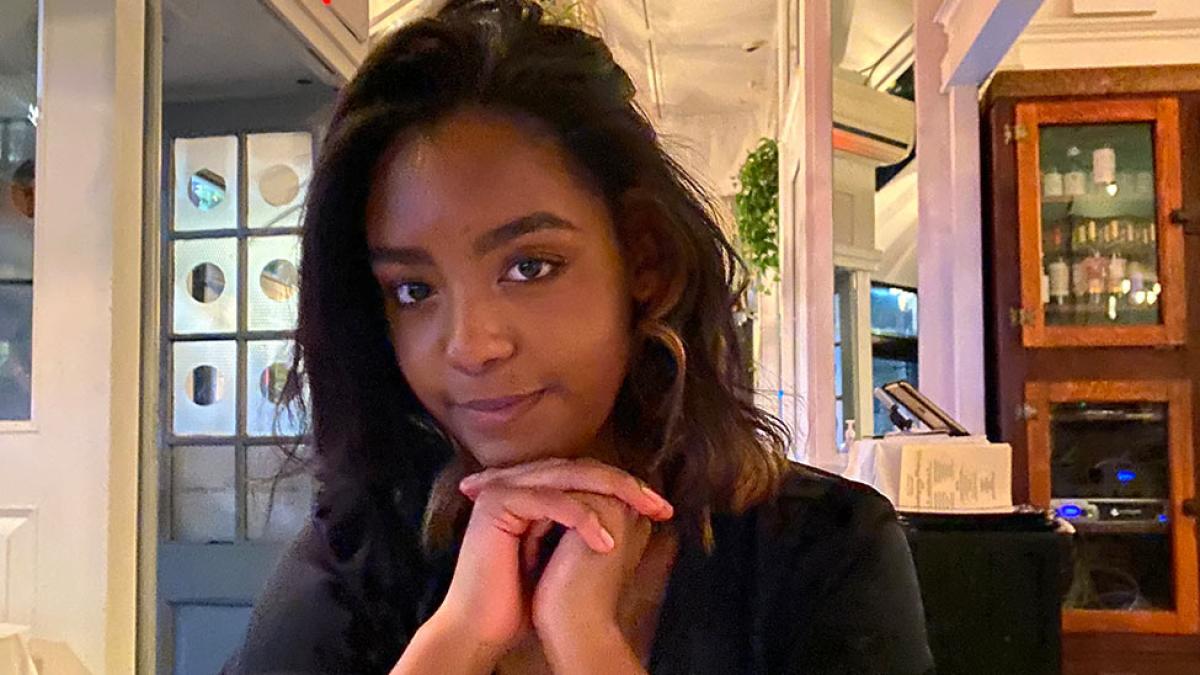
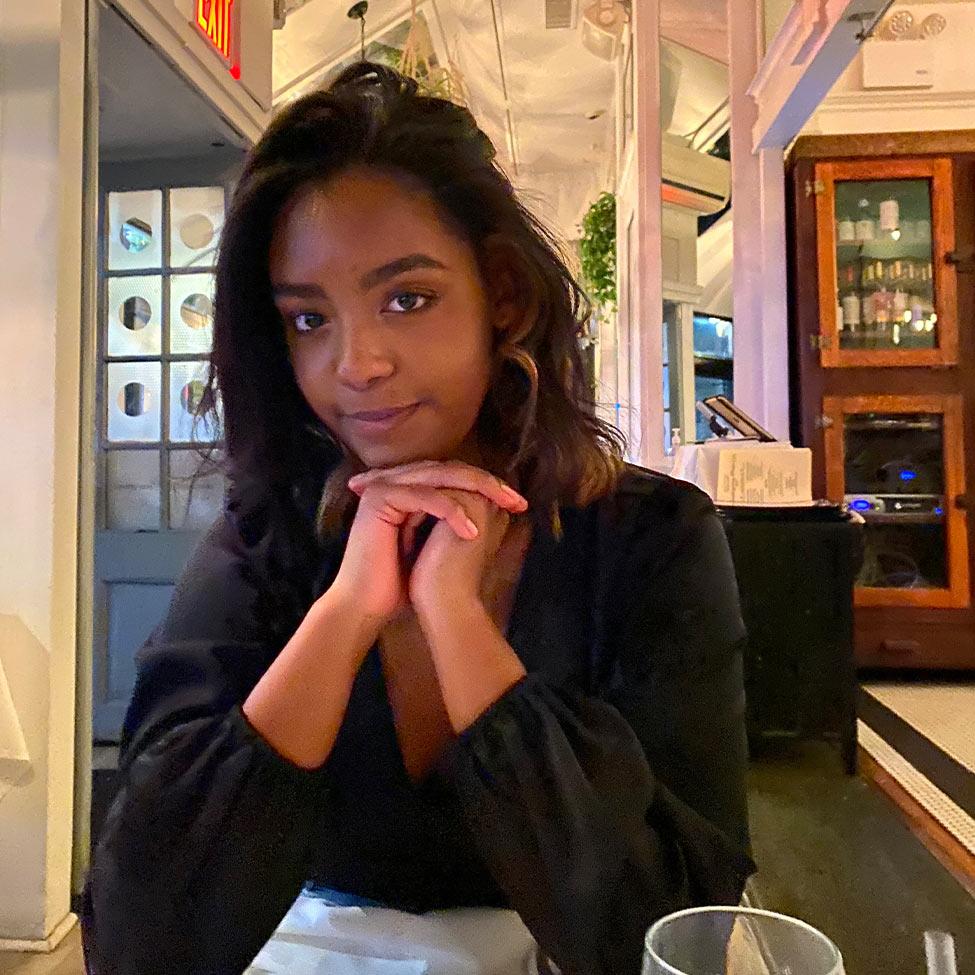
How did you decide to major in Writing for Diversity and Equity in Theater and Media?
I was initially drawn to Pace for performing, but I started freshman year as a Film and Screen Studies major. When I got to Pace, there was a meeting happening for a storytelling fellowship that I wanted to join, and that's how I met Brian. He was talking about the major and introducing himself. I was really inspired and gravitated to the work that he was doing. As a person of color, and someone who wants to work in film and theater and media, and as someone who writes, it's really important to me to have diversity and equity at the forefront of my work. To see someone who is a professional doing this work with real-life contacts in the industry, that was something that really stood out to me. I am someone that wants to get the most out of my education, so getting real-life access while also seeking a degree was important to me.
What drew you to Pace overall?
I've been involved in performing arts since I was a kid. I've been acting and performing since I was nine years old, and I went to a really good high school for performing arts, and we had an amazing theater program. My directors and everyone at that school really helped me cultivate my voice as an artist. I realized that that's what I wanted to do with my life, and I’ve never really doubted myself as a creative. I want to continue that education and learn from new people, and now I'm able to do that in a major that I feel suits my mission and what I want to contribute when taking up space.
When S. Brian Jones describes the program, he says the goal of the program is not necessarily to get students a seat at the table but rather to empower them to create their own table. What does that mean to you and how have you seen that come to life?
That means everything to me in the work that I'm doing. It's super important to me to create art, not with the intention of fitting into spaces that already exist and falling into norms within the industry that weren't made to welcome people who look like me, authentically, as we know. With the nature of how the industry works, people of color have to work "ten times harder.” I don't want to have to force myself to fit into environments that don't value my voice. Personally, I'm not writing to contribute and sell to major studios with a history of exclusion. I want to work with my peers. I want to work with people that look like me, as well as those with important stories from other marginalized communities. I personally am a Black and Indigenous woman, so I want to hold up stories that are speaking to those communities, of course. For me, my writing has been trying to treasure that, and realizing that, like all my peers, we all have unique voices, and we all have different stories that we want to tell.
What classes or experiences have impacted you most so far?
I currently am working with a screenwriting professor who is truly amazing. He’s a professional working writer at Hulu and HBO. I think that's the most we can get out of our education—learning from people who are actually doing the work that they're teaching you how to do. And I love screenwriting. I love analyzing how things are filmed from script with popular movies, especially seeing how things translate from the paper onto the screen. He really does a really good job of helping me understand that in ways that I didn't know before coming to Pace.
We also went on a field trip to The Players, which is a community space for people who work in the industry, whether it be writers or performers. We got to meet some artists and be shown around this very exclusive space. After these field trips, we’ll talk about what would we contribute to that space if we were in that environment. And I think that's Brian’s artistry—showing us all of this, and then asking us to envision ourselves in the space and to ask ourselves how we can make the space better. Because everyone can try to fit into a mold, but if you don't have a story to tell, then you're taking up space from someone who would have a story to tell. We are here to create space, and that's one of the many beautiful parts of this major.
As a person of color, and someone who wants to work in film and theater and media, and as someone who writes, it's really important to me to have diversity and equity at the forefront of my work.
What are your long-term goals?
My long-term goal is to work in the realm of directing, but I also see myself as a complete artist, and I think that's something that this major also really focuses on. We want to see ourselves as whole artists so that we can fit into different worlds of artistry and figure out what works for us. I’m in a video gaming narrative class right now taught by a Black woman, Novera King, who creates narrative writing for video gaming, which is the coolest job in the world. She explained all the stages of her career, which started in writing rooms. But she saw herself as a whole artist and didn't limit her ability, because writing is not just about writing for the screen or stage, but if you have a story to tell, it can fit into so many different genres of artistry, such as video games. Film directing is a goal, and that's genuinely what I would love to do, but I really value writing, so you could also say that I want to be a screenwriter. Right now, I am creating stories that someday I would love to see put on screen.
What are you looking forward to most for the rest of your time in this program and at Pace?
I'm most excited to see the cohorts under us come up because we were in the pilot program. I'm a member of the first group of people in this major, and I could count on one hand how many people there were that first semester. Now we have a full table of people coming into my third semester in the major. It's really exciting to see freshmen who are able to start out in the major. I hope we’re setting a good example for them and getting new and younger voices into the room to contribute. I'm really excited to see the progression of our writers’ room. I want to see it get bigger. I want to see it get more diverse. I want to see more faces. I want to see more people with differing experiences that are willing to share because that's what this medium is all about: collaborating with your peers and taking in other people's perspectives.
What would you tell a younger student who's considering majoring in this program?
I would say if writing is important to you and you're looking to cultivate your voice as a writer, then this is the major for you. If you value DEI in media that you consume and you want to create media that's going to be consumed by someone who looks like you or looks like your peers, then this is the major for you. You’re going to get a lot out of it, and you're going to learn so many skills and get in contact with so many people and have access to cool opportunities that a lot of other majors don't necessarily have access to. That's the exciting thing about this program—it's only getting started and we're already experiencing all of these cool things. And with the Rothschild funding being renewed, it's so exciting to see all of the possibility that we now have.
More About the Major
As a first-generation Mexican-American and college student who has always been fascinated by film and theater, Cambria Kylinn Martin '24 is relishing the opportunity to explore identity and intersectionality through the Writing for Diversity and Equity in Theater and Media program.
Dreana Henry '26 is among the first students to come to Pace specifically to major in Writing for Diversity and Equity in Theater and Media. She's fully embracing the industry connections she's already made, while looking forward to pursuing more opportunities the program—and New York City overall—have to offer.
Pace University’s Bachelor of Arts in Writing for Diversity and Equity in Theater and Media Arts, housed in the Dyson College of Arts and Sciences, has received a two-year, $609,000 grant from The Edmond de Rothschild Foundation that continues its support of the program.
Q&A with Dreana Henry '26
Dreana Henry '26 is among the first students to come to Pace specifically to major in Writing for Diversity and Equity in Theater and Media. She's fully embracing the industry connections she's already made, while looking forward to pursuing more opportunities the program—and New York City overall—have to offer.
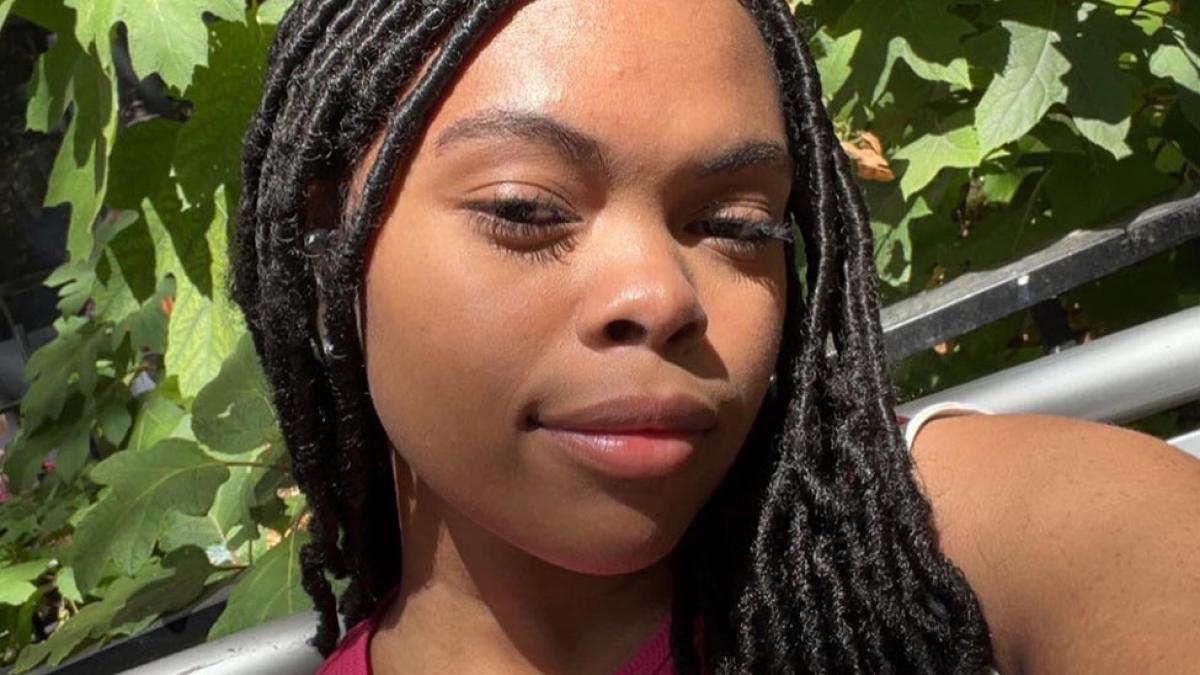
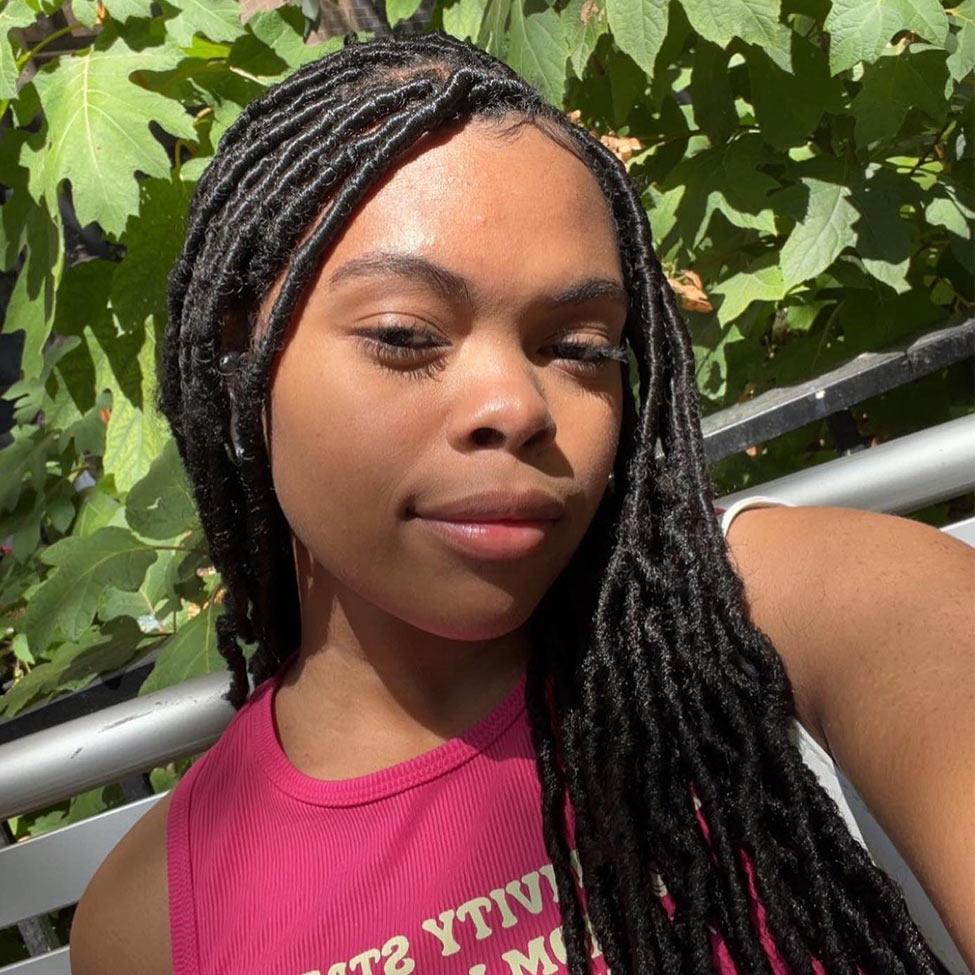
As a first-year student, did you know about this program when you were applying to Pace?
I did, actually. Originally, I was looking for a creative writing major or a screenwriting major. When I was looking, I saw that Pace had a Writing for Diversity and Equity in Theater and Media major, which is exactly what I wanted to do, so that's why I ended up choosing to apply. I knew Pace had a great arts program, so that drew me to Pace overall.
What drew you to this program specifically?
I've never actually seen a major that was super focused on diversity and equity all around, so I thought it was really interesting that there was a program where I could learn not only how to screen write, but to write novels too. I had never seen something that was so diverse in that way.
When S. Brian Jones describes the program, he says the goal of the program is not necessarily to get students a seat at the table but rather to empower them to create their own table. What does that mean to you and how have you seen that come to life?
I've always thought, “Oh, I want to work for Warner Brothers,” or I want to work for any other big writing company or theater company. But I've always had to ask, do they produce the things that I want? Do they produce the shows or the movies that I can see myself being a part of in any way? And usually, I have a hard time answering that question. I don't want to form my art to fit in a place that doesn't belong to me. I’d rather create my own.
What are your long-term goals? And how do you think this program can help you get there?
Some of my long-term goals are to write a screenplay and to act as well. I think this major is really going to help me because I've already been introduced to local companies such as The New York Theater Workshop. I've been exposed to all these great theaters and met a bunch of actors and writers and costume designers who are already in the business. I've only been here for a month and a half, and I'm already learning a lot about what the business is like.
I don't want to form my art to fit in a place that doesn't belong to me. I’d rather create my own.
Are there any challenges you've overcome that you're proud of and would like to share?
One of the biggest challenges has been coming to New York and trying to find my place in the city. I’m trying to figure out how I'm going to navigate following my dreams, what path I should take, what opportunities I should take, and how to get those opportunities. It's a big challenge of exploration and taking charge of what I want to do next.
Being in their shoes not too long ago yourself, if a prospective student was considering majoring in this program, what advice would you give them?
I'd tell them to come in with an open mind and to not expect to be the best of the best. Don't put any pressure on yourself to know what you're doing or to know what you want to do in the future, because it's all about the journey and exploration.
Is there anything else you'd like to add about the program or your time so far?
I really do enjoy the program. We have cohort meetings where we all get together and talk about things in the media and how it relates to equity and inclusion and how we feel about it. For example, we were talking about the new Little Mermaid movie that’s coming out and how a lot of different people feel about that. It brings up a lot of good conversations. It really gets you thinking about the writing world.
More About the Major
As a member of the pilot program for the Writing for Diversity and Equity in Theater and Media major, A'ishah Muhammad '25 is excited at how the program is continuing to grow, welcoming more voices and perspectives into their writers' room.
As a first-generation Mexican-American and college student who has always been fascinated by film and theater, Cambria Kylinn Martin '24 is relishing the opportunity to explore identity and intersectionality through the Writing for Diversity and Equity in Theater and Media program.
Pace University’s Bachelor of Arts in Writing for Diversity and Equity in Theater and Media Arts, housed in the Dyson College of Arts and Sciences, has received a two-year, $609,000 grant from The Edmond de Rothschild Foundation that continues its support of the program.
Q&A with Cambria Kylinn Martin '24
As a first-generation Mexican-American and college student who has always been fascinated by film and theater, Cambria Kylinn Martin '24 is relishing the opportunity to explore identity and intersectionality through the Writing for Diversity and Equity in Theater and Media program.
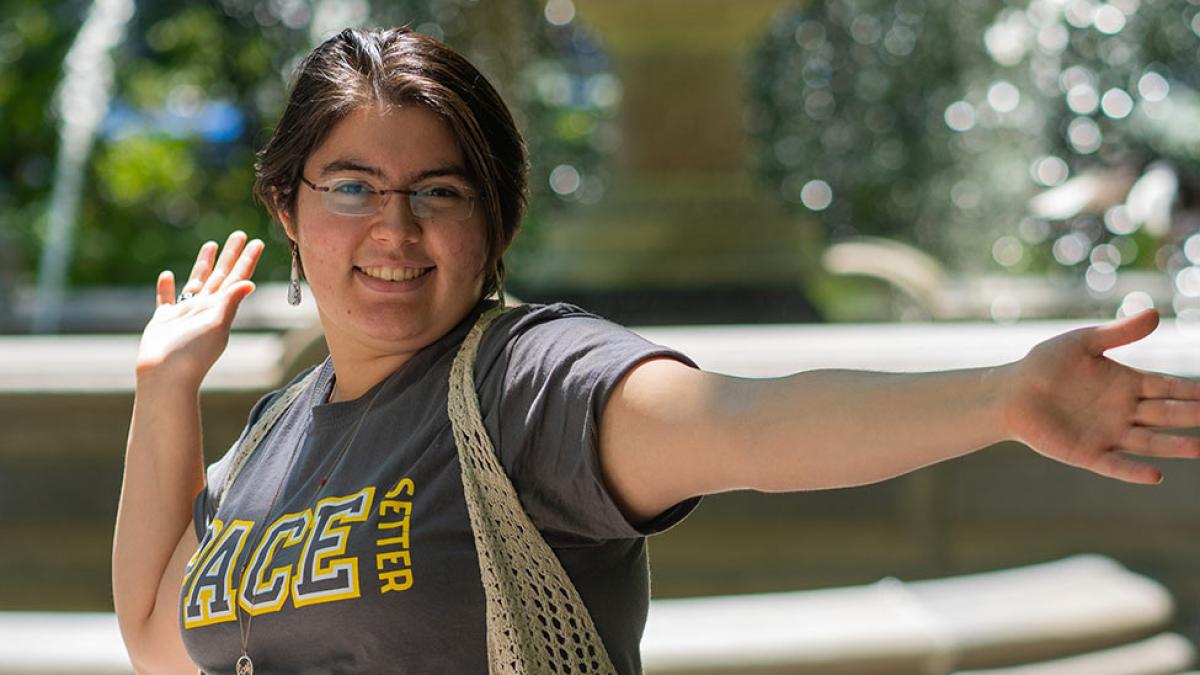
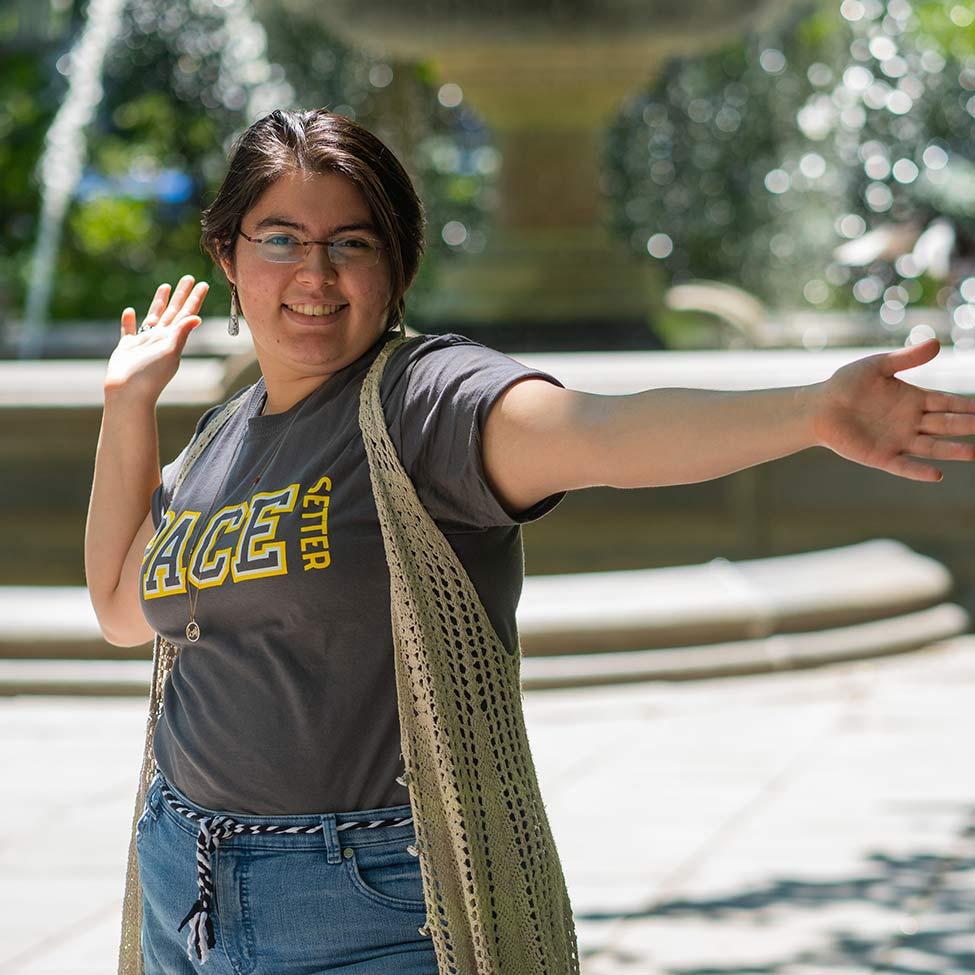
What drew you to Pace?
I applied to Pace on a whim because I wanted to go to New York. I heard of Pace from a student stage manager in our senior production in high school in Santa Monica, California. I’ve always had a fascination with film and theater, and I never had been to New York before, but I wanted to go. So I packed my bags and came to NYC in fall 2020 with all the fears and hopes for the future.
What drew you to the Writing for Diversity and Equity in Theater and Media program?
I found out about the program when I was helping people move in as part of my responsibility as vice president for the Residence Hall Association (RHA). I attended a webinar introducing the new major, and then I went and met S. Brian Jones. I felt like it was serendipitous that I ended up at Pace and that this program came about, because the program was explained in the words that I have always used to describe what I wanted to do. My parents are from Jalisco, Mexico and within the lives of my parents, siblings, and me, there was a lot of assimilation that was done. I never saw myself or any of my family represented in the media. Even as a pale Latina, with colorism heavily present in media, I noticed from a young age the binary that looms over the concept of identity with race and ethnicity. When I talked to Brian, we bonded about Cinderella with Brandy and Whitney Houston from 1997, and we just could not stop talking about what we want to see represented of ourselves, our identities, and our families in media. That’s when I knew that we were going to get off on the right foot.
Which classes or experiences from the program so far have had the greatest impact on you?
For my first class in the major, I got to do Creative Writing: Drama and learn how to actually be a playwright. I had a professor who also has a connection to Mexico as a Chicano, which was a rare thing to find because I feel like I haven't met a lot of Mexican-Americans or Chicanos here in New York. Having that professor, Beto O’Byrne, understand the cultural things I'm talking about has been a core thing and form of guidance for me.
When S. Brian Jones describes the program, he says the goal of the program is not necessarily to get students a seat at the writers’ table but rather to empower them to create their own table. What does that mean to you and how have you seen that come to life?
Even before high school, I knew I wanted to do something in theater or film, something especially centering on identity, specifically Latin American identity and all of its intersectionality. S. Brian Jones is someone who you can feel an immediate intellectual connection with. We understand each other, and we understand artistically how we want to approach things. To think about making my own table, I feel very privileged to be able to have that opportunity, and I hope to be able to do more with that platform, whatever it might be. I think about when I was a little kid watching Brandy in Cinderella—I think about those little kids who probably have not seen themselves on screen, on stage, in literature, or anything with identity and all its facets of race, ethnicity, culture, sexuality, etc. To be able to think that with this program, with the people that I'm meeting who are in my cohort, to have the ability to give that experience [to see themselves on the screen] to more kids, it just warms my heart and keeps me going.
To be able to think that with this program, with the people that I'm meeting who are in my cohort, to have the ability to give that experience [to see themselves on the screen] to more kids, it just warms my heart and keeps me going.
Have you participated in any internships?
Through my Pace Storytelling Fellowship, I got to have an internship in the summer with the Atlantic-Pacific Theater here in New York, which was the first time I got to do theater since the pandemic. It was at the New Ohio Theatre, as part of the Ice Factory Festival 2022. I was a stage manager, and I got to do familiar things in that role since I’ve done it and numerous other roles like it, before back home at Morgan Wixson Theatre, and I was also learning how to help in all facets of the production as an adult. I also got to shadow my mentor, Beto O’Byrne, in the new show they’re working on, since they finished their previous show that was also at that same theater, which was another full-circle moment.
Are there any challenges you have overcome that you’re proud of and would like to share?
I'm a first-generation Mexican-American, but also a first-generation college student, and this is all very new. Even if there wasn't a pandemic, it's very new, and everything would be daunting. I’m just trying to trust the process, which is something we would always say in theater tech. I try to tell myself to trust that everything happens for a reason.
What are your goals for the future?
I know S. Brian Jones would say to try and go into a less populated and oversaturated market for entertainment. But I worked so hard to come to New York, and I would love to stay in New York in theater or go back to California to LA to work in film. I think during these next two years before I finish college, since these first two went by so quickly, I'm just going to try to remind myself that it's okay to make mistakes and to keep cultivating those relationships that actually feel genuine rather than just networking for networking’s sake. I’ve wanted to write, act, direct, and produce since I was a little kid getting lost in a movie and/or musical, so there is always the hope to learn more and expand. I do hope to have a production company of some sort that can focus on Latin American identity, but not be exclusive to it. Our culture is so large that I want to cultivate a space where we can have our stories told by us. I am only one type of Latin American, so I want to have more of our voices in the cultural zeitgeist so that people can see who we really are as an ethnicity full of different countries, languages, races, religions, and so much more that cannot be encapsulated and/or expressed by one single person. It’s a group effort, and I hope to contribute to it.
More About the Major
Dreana Henry '26 is among the first students to come to Pace specifically to major in Writing for Diversity and Equity in Theater and Media. She's fully embracing the industry connections she's already made, while looking forward to pursuing more opportunities the program—and New York City overall—have to offer.
As a member of the pilot program for the Writing for Diversity and Equity in Theater and Media major, A'ishah Muhammad '25 is excited at how the program is continuing to grow, welcoming more voices and perspectives into their writers' room.
Pace University’s Bachelor of Arts in Writing for Diversity and Equity in Theater and Media Arts, housed in the Dyson College of Arts and Sciences, has received a two-year, $609,000 grant from The Edmond de Rothschild Foundation that continues its support of the program.
Pace Environmental Law Review (PELR) hosts annual Environmental Law Symposium
The Pace Environmental Law Review (PELR) held its annual symposium titled “Environmental Constitutionalism” on Friday, October 28, 2022. Hosted by the Elisabeth Haub School of Law at Pace University, the virtual symposium attracted over 100 attendees, bringing together scholars, advocates, regulators, policymakers, and students worldwide to discuss constitutional environmental rights.
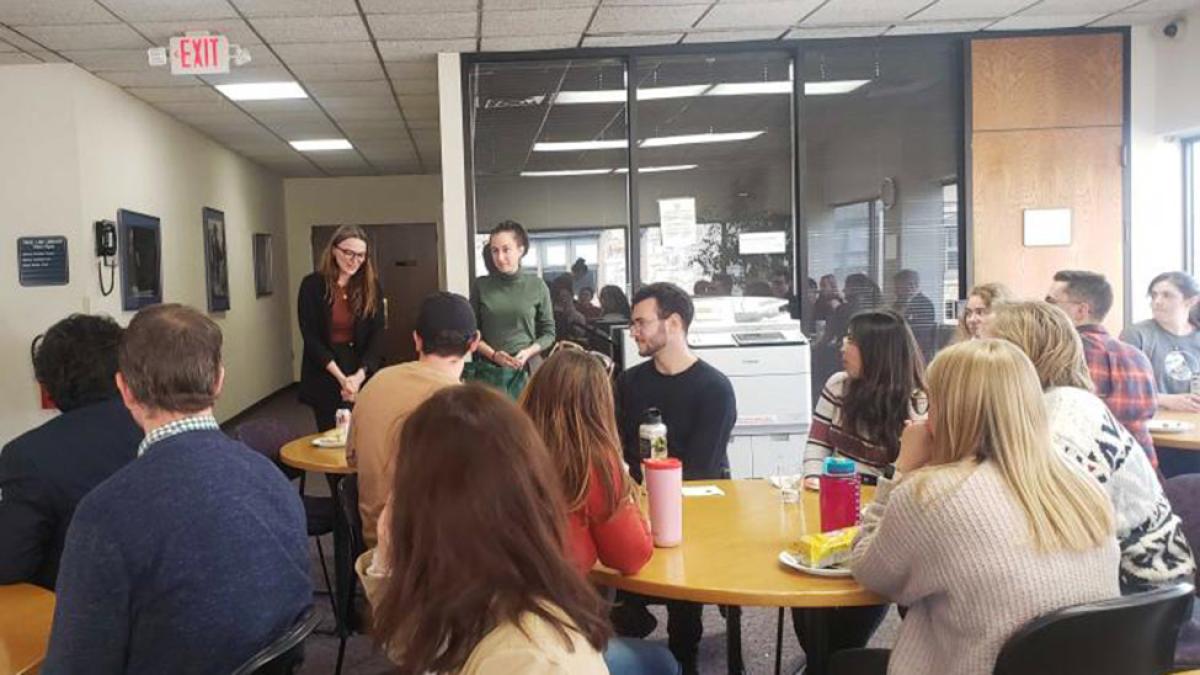
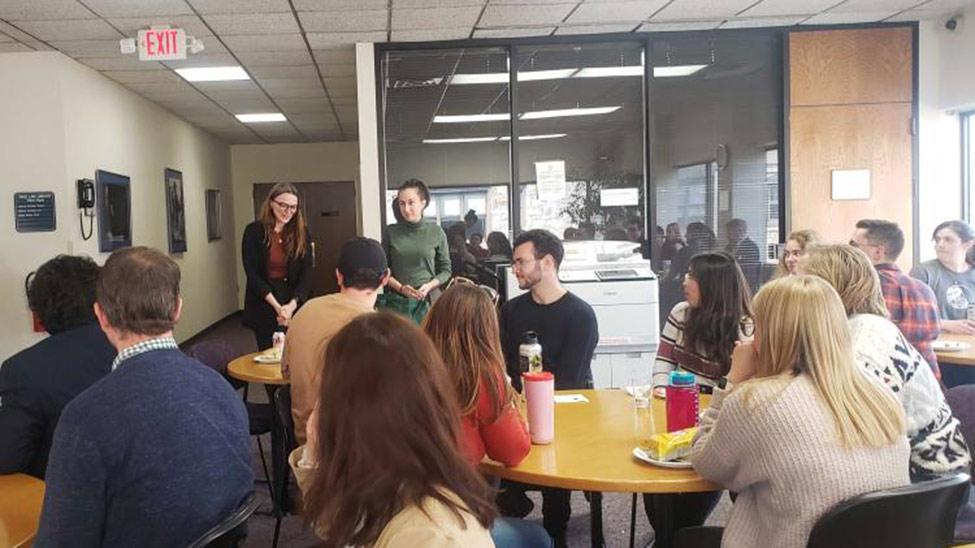
The Pace Environmental Law Review (PELR) held its annual symposium titled “Environmental Constitutionalism” on Friday, October 28, 2022. Hosted by the Elisabeth Haub School of Law at Pace University, the virtual symposium attracted over 100 attendees, bringing together scholars, advocates, regulators, policymakers, and students worldwide to discuss constitutional environmental rights.
How can people assert constitutional environmental rights? Can these rights help fill the legal gaps for action on climate change or environmental justice? What can we learn from the experience adopting and implementing environmental rights to date? After an opening note by Haub Law alumna Maya van Rossum ‘92, Founder of the Green Amendment For The Generations Movement & Author of The Green Amendment, Securing Our Right to a Healthy Environment, the 17 participants addressed these questions and more.
The panelists, and their topics, included:
Prof. James May of Widener University Delaware Law School - Are environmental rights, thus far, altering environmental outcomes?;
Prof. John Dernbach of Widener University Commonwealth Law School - Why Environmental Rights Matter;
Prof. Suryapratim Roy & Alexandru Gociu of Trinity College Dublin - Climate Litigation and the Norwegian Constitutional Principle of Sustainability in Human Rights Context;
Prof. Quinn Yeargain of Widener University Commonwealth Law School - State Constitutions in the Woods;
Timothy Cox of Catskill Watershed Corporation - New York Forever Wild;
Prof. Heidi Gorovitz Roberston of University of Maine School of Law - Considerations for the crafting of subnational constitutional rights to a clean environment;
Prof. Michael Lewyn of Touro Law - Environmental Rights Amendments: What Could Go Wrong;
Prof. Heather Tanana & Elisabeth Parker of the University of Utah S.J. Quinney College of Law - Indigenous People’s & Healthy Environment;
Prof. Rebecca Bratspies of the City University of New York School of Law - Administering Environmental Rights: Using New York’s New Green Constitutional Amendment to Build a Statewide Culture of Environmental Justice;
Prof. Steven Ferrey of Suffolk Law School - State ‘Federalism’ Blocking the Biden Sustainable Infrastructure Improvements in the U.S.;
Prof. Sonya Ziaja of University of Baltimore School of Law - Secret Lives of Environmental Rights; and
Prof. Sean Lyness of New England Law School - The Constitutional Public Trust in a Warming World.
“It is encouraging to see how many thoughtful scholars around the world are working to understand the potential role of environmental rights in building a sustainable future,” said Haub Distinguished Professor of Environmental Law and PELR Advisor, Professor Katrina Fischer Kuh. “I applaud the PELR for providing a forum to share learning and ideas about the adoption, implementation, and assessment of environmental rights approaches and anticipate that the symposium articles will make important contributions.”
The panelists’ articles will be published by PELR in the next year. PELR has a robust history of environmental publications dating back decades, which can be found on the PELR website. Haub Law launched its Environmental Law Program in 1978, and it has long been ranked among the world’s leading university programs, with a current #1 ranking by U.S. News and World Report.
Haub Law Students from Fairbridge Investor Rights Clinic Win Arbitration Round at National ADR Triathlon
A team of students from the Elisabeth Haub School of Law won first place in the arbitration round at the 13th annual Securities Dispute Resolution Triathlon, held virtually on October 15 and 16, hosted by the Hugh L. Carey Center for Dispute Resolution at St. John’s School of Law and the Financial Industry Regulatory Authority (FINRA). The team of three students included 3L Mary Neil, 3L Roberto III Quiroga, and 3L Aric-James Prazeres, who all represent the Law School’s Fairbridge Investor Rights Clinic as current or former interns.
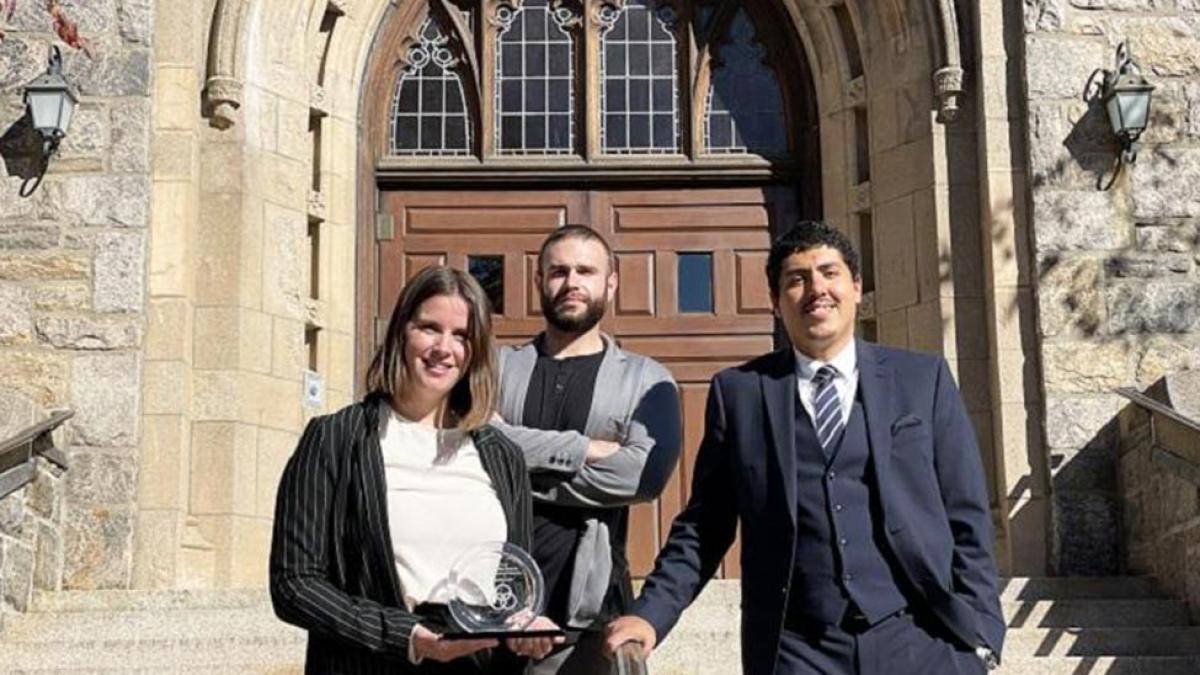
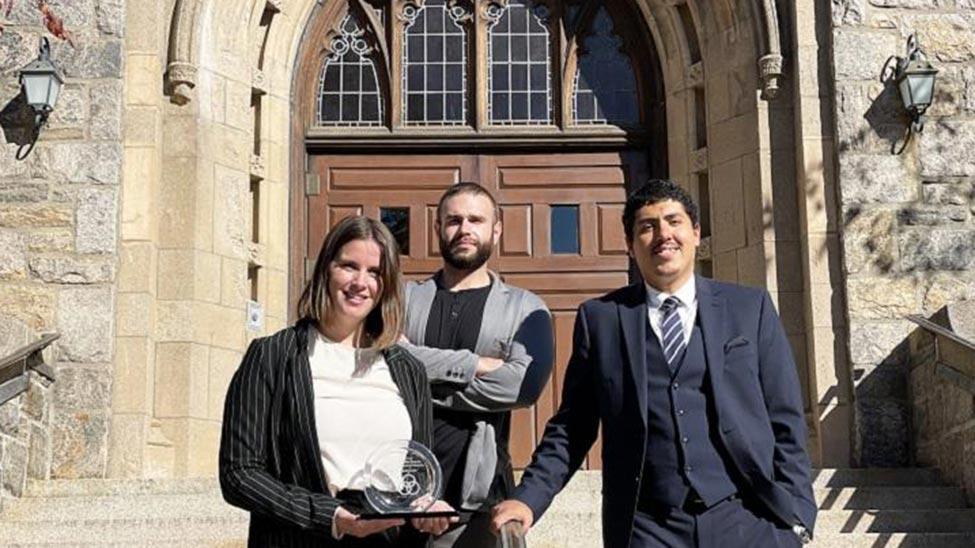
A team of students from the Elisabeth Haub School of Law won first place in the arbitration round at the 13th annual Securities Dispute Resolution Triathlon, held virtually on October 15 and 16, hosted by the Hugh L. Carey Center for Dispute Resolution at St. John’s School of Law and the Financial Industry Regulatory Authority (FINRA). The team of three students included 3L Mary Neil, 3L Roberto III Quiroga, and 3L Aric-James Prazeres, who all represent the Law School’s Fairbridge Investor Rights Clinic as current or former interns.
Fairbridge Investor Rights Clinic alum Britny Auletti ’17, Associate Attorney at Eversheds Sutherland, served as the main coach for the team, with coaching support provided by Haub Law Professor Elissa Germaine, Executive Director of John Jay Legal Services and Director of the clinic.
“I am proud of the hard work and collaborative team effort of our students, which resulted in an amazing outcome,” said Professor Germaine. “The students’ experience in the clinic helped them prepare for and succeed in the Triathlon, and their participation in the Triathlon will help them in representing our clinic clients – novice investors of modest means like the client in the competition problem – and in their work after graduation.”
The Securities Dispute Resolution Triathlon is a two-day competition that tests law student ability in each of the three main ADR processes—negotiation, mediation, and arbitration. Students compete as advocates, settlement counsel, and clients in a securities dispute. At the outset they attempt to negotiate a resolution, then they represent their clients in mediation, and finally they proceed to arbitration before a three-person panel.
Members of FINRA’s roster of experienced neutrals serve as mediators, arbitrators, and judges, critiquing the student teams and offering the students an invaluable real-life experience. In addition to honing the students’ advocacy and ADR skills, participation in the competition fosters connections with alumni, law students from other schools, and FINRA neutrals and staff.
An impressive 14 teams from law schools around the country participated in this year’s Triathlon, tackling a timely and challenging competition problem concerning the supervisory obligations of a FINRA member firm and broker-dealer with respect to self-directed trading by a novice investor using an online platform.
Professor Bennett Gershman on SCOTUS Ethics
Pace University, Elisabeth Haub School of Law Professor Bennett Gershman discusses gaps in the code of ethics for Justices of the Supreme Court of the United States and the interest among lawmakers for a broader Justice Reform Bill in Congress on the Newsy Morning Show.
Elisabeth Haub School of Law Professor Bennett Gershman discusses gaps in the code of ethics for Justices of the Supreme Court of the United States and the interest among lawmakers for a broader Justice Reform Bill in Congress on the Newsy Morning Show.
Lawyers Slam Donald Trump’s Video Deposition In His Latest Lawsuit: ‘Who Does He Think He Is?’
“He is not loved in the Bronx” “I’m a civil rights lawyer. If I can get a case into the Bronx, I’ll move heaven and earth,” Randolph McLaughlin, Pace University law school professor and co-chair of Newman Ferrara LLP’s civil rights practice group told The Guardian. “Bronx juries, they engage in Robinhood-ism. They take from the rich and give to the rest of us – their verdicts are always generally right at the ceiling.”

